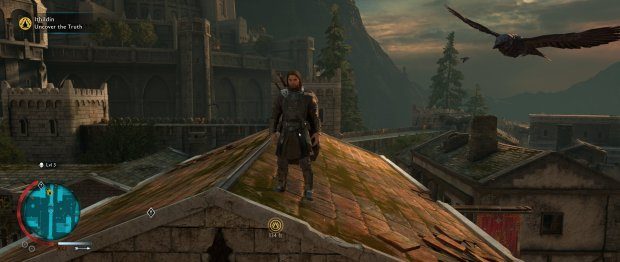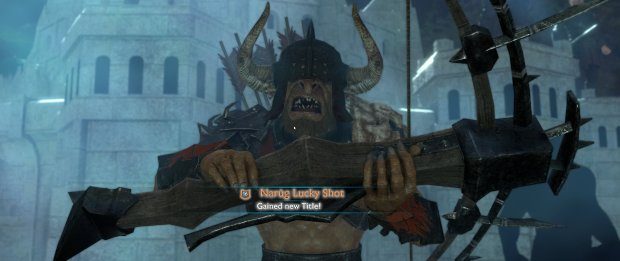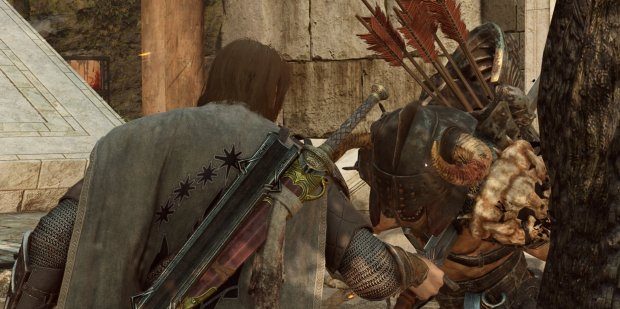Middle-Earth: Shadow Of War shows that revenge is a dish best served re-heated
Got your own back
Nothing does revenge quite like Middle-Earth: Shadow Of War [official site]. But more games really really should.
When Shadow Of Mordor came out in 2014, no one was really expecting it to be good. But it was great. And the greatest thing about it was its Nemesis system. Because your character is already dead, and possessed by a grey, grey ghost, getting killed by an enemy was not your end. Instead you woke up at a respawn tower, with vengeance on your mind. The orc that killed you would automatically be given a promotion, a ranking among the orc leadership in the area, and greater abilities. He'd also be given a personality, strengths and weaknesses, and most of all, a name.
What made Shadow Of Mordor's system quite so clever was that it made it seem as if those latter factors were in place before he killed you. It allowed the game to create the illusion of a world packed with uniquely identified enemies, despite their thousands, and convinced you that it mattered who chopped you to bits. Then, should they go on to kill you again, they'd climb higher in the ranks. Of course, by the second half of that game you were able to manipulate this, brainwash orcs onto your side, and then sneak them up through the ranks by killing their superiors. But even before it got this complicated, it felt so very different.
I predicted at the time that every other game would be copying this. Not perhaps the complexities of the whole Nemesis System, but at least the idea of offering the player revenge. Because let's face it - outside of roguelikes (and not even roguelites) players are always immortal. Whether it's thanks to quicksaves, checkpoints, or some other loophole, you can't die in a game, you can only be temporarily set back. Try again, kill what killed you last time, carry on. Games are just ripe for "borrowing" this idea of revenge!
Straight away, Shadow Of War - for all its overly-busy approach and god-awful droning story interruptions - reminds you of this. If you can only get it to stop bloody interrupting you long enough to play for a moment, it's from the very start that you can start creating your own little narratives of hate.
For me, the first to stick in my memory was Narûg the Grim. Or Narûg Lucky Shot as he decided to rename himself after a period of umming and ahhing over my corpse. Level 15, he was a strong one with a mighty crossbow, and took me by surprise in a moment of having been greatly weakened. Immediately promoted, and cocksure, he strutted away from my body enormously proud of himself. So on reawakening I of course immediately abandoned all my quests to go kill the bastard.
He was level 16 now, made a Dark Tracker, so still a tough fight. But a fight I was prepared for. I'd killed a lot of orcs on my way toward him to fill my Elf Rage meter, such that I could unleash fury on the sod and see him grimly defeated. And so I did. And I gloated. Quietly to myself in my room. Revenge.
It meant a lot more thank killing just any old orc. It meant a lot more than killing even a named orc, with his own little cutscenes and rants. This was revenge. We had a relationship. It's that meaning that I was certain other games would covet, would want to invent their own ways to realise. Three years on from SoM's release, we'd surely have started seeing the games influenced by it already if we're ever going to. And we're not!
I'll tell you what I did see in this sequel, though. Narûg Lucky Shot appear above me on the walls of a courtyard. I had, he snarled at me, "left him for dead". But now he was back, a lot more alive, level 18, and particularly cross with me. Now, with his crossbow pointed at my face, he wanted his revenge.
He didn't get it. And rather unfortunately for the telling of this tale, the game rather let me down in his dying. For some reason it glitched out of giving me his slow-mo death sequence, his name crossed out in red on the screen. He just died in a heap with some others. And that was that from Narûg Lucky Shot. Which isn't a great punchline.
But the point stands. And is even better emphasised by the sequel's continuation of one of the strangest features in the original - the ability to jump into someone else's game and get revenge for a stranger! Revenge, revenge, revenge. It's what both these games are all about.
That's true of its story too, although it's sadly one told seemingly by an author who was wholly unaware what game he was writing it for. The po-faced SEVERITY and CONCERNED FACES of the cutscenes are woefully out of place in a nonsense action brawler with enemies that shout silly jokes at you. But still, your character - I forget his name, being the blandest character in all of gaming history - is out to revenge his usefully murdered female relatives (thanks, ladies). And the ghostie that possesses him is out for revenge on Sauron, after the naughty wizard stole his pretty ring or somesuch. A storyline that one might just be able to guess doesn't end in success - sorry if that's a spoiler for those who haven't read the first page of the Lord Of The Rings.
Shadow Of War goes further in its attempts to make moments of revenge more meaningful, making mini-missions out of it, occasionally giving it more weight than just stumbling upon your old murderer and giving him some what-for. In this respect at least, it really understands what made the first game so richly rewarding. It proves that revenge is a dish best served reheated, frankly. And yet, still, we're not seeing everyone else realise that they don't need a ghostly gimmick to put revenge front and centre in their games, because almost everyone we play as is immortal.
Everyone else! Realise! Give your enemies something to live and die for!





